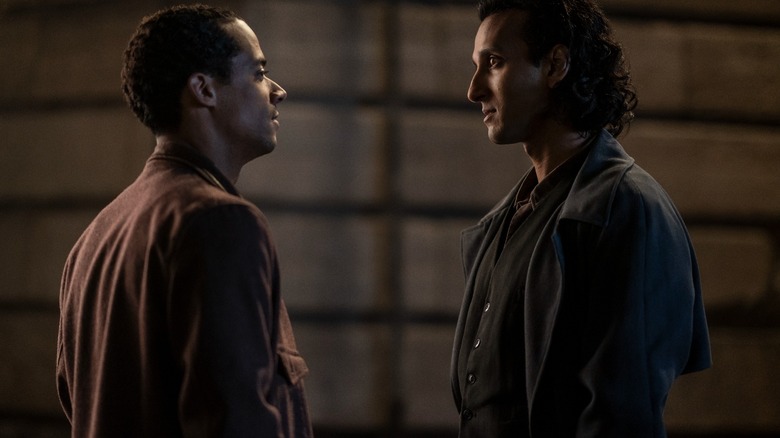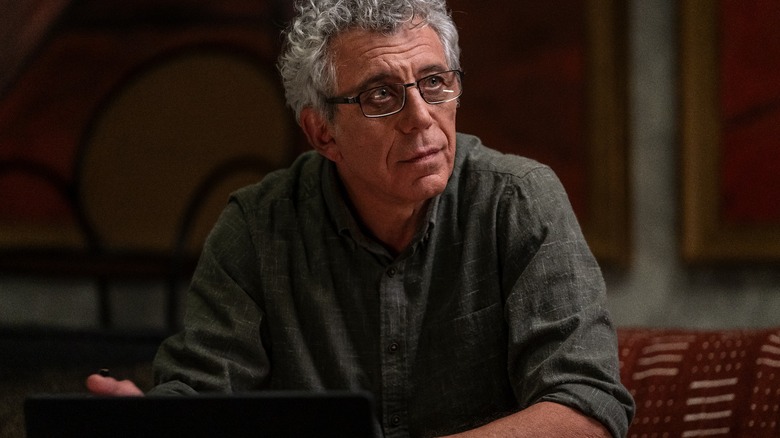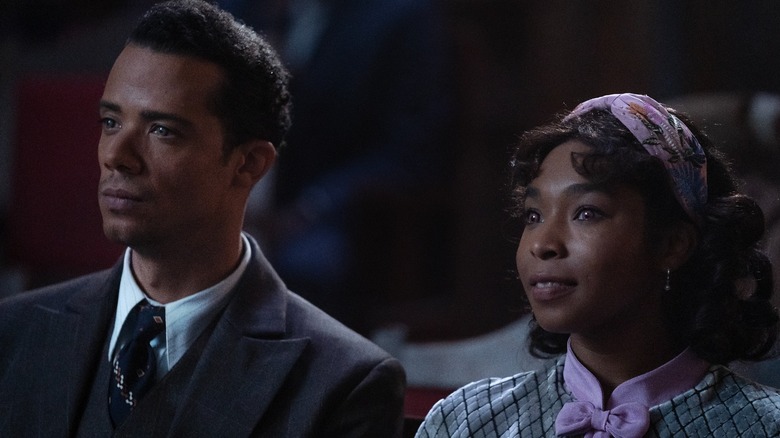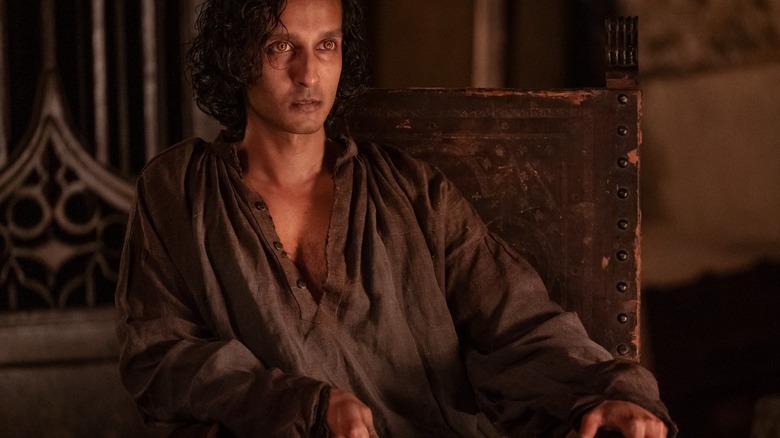Interview With The Vampire Season 2 Keeps One Of The Best Parts Of The Novel
This post contains spoilers for AMC's "Interview with the Vampire."
What is the price of being immortal? The true bane of immortality is erosion, where memories elongate and distort over time, and our perceptions of people ebb and flow with the power of hindsight and the lull of nostalgia. If an immortal were to narrate their lives on record, recount every delightful and traumatic memory in vivid detail, would these accounts be considered "truth"? This crucial question lies at the heart of the season 2 premiere of "Interview with the Vampire," which builds on the slanted truth of its first season and deepens the distortions of experiencing emotions that never end.
The AMC show has already proven its ingenuity in adapting a classic novel series that is beloved and controversial. It has identified the core appeal of Anne Rice's "The Vampire Chronicles" by leaning on the novel series' danger-tinged eroticism and the complex portrayal of humanity (or lack thereof) in vampires while reframing its problematic aspects of race and sexuality. Louis (Jacob Anderson) is perhaps the series' most intriguing, dynamic reframing, but as his character is intricately entwined with that of Lestat (Sam Reid) and Claudia (Bailey Bass in season 1, and Delainey Hayles in the new season), our understanding of them also shifts, evoking parallels and contrasts with the books.
Although Rice's initial intention in her 1976 "Interview with the Vampire" was to present Louis' version of events as closest to the truth, this underwent a retcon of sorts with her 1985 "The Vampire Lestat," written from Lestat's point of view, which severely contradicts Louis' perspective. This interpretative subjectivity where two versions of "truth" clash has been expertly balanced by the show in its first season, but the season 2 premiere takes this debate regarding unreliable narration even further.
Who is the unreliable narrator in Interview With The Vampire?
It is crucial to acknowledge that narrative unreliability does not necessarily paint someone as a liar, as the process of recollecting memories and interpreting events is inherently subjective. Season 1 explicitly pokes holes in Louis' narration with Daniel Molloy (Eric Bogosian) questioning it, as he has already heard a different version of the same events almost 50 years ago. The core tenets of the events remain the same, and it is clear that Louis' relationship with Lestat is dysfunctional and intoxicating all at once, but Louis' framing of these sentiments adds distinct tints to our understanding of the characters. In 1973, Louis' perception of Lestat was more embittered, but in 2022, his recollection of their bond is more passionate, more tumultuously romantic.
Rice's Louis can also be interpreted as an unreliable narrator within the framework of "The Vampire Lestat," where the former's motivations to present events with omissions could be chalked up to a desire to present himself a certain way, or the distortion of memories over such a long time, which prompted him to either deliberately embellish events or sincerely fill in the blanks the best he can. In the show, Louis' impulses can be seen as a combination of all of the above, mixed with factors still unknown to us.
Moreover, even Lestat's point of view in "The Vampire Lestat" needs to be taken with a heavy grain of salt. As remorselessly blunt as he seems, his perceptions are bound to be distorted, as acknowledging Louis' victimhood would mean admitting to his monstrosities. While Lestat revels in being an apex predator, he desperately wishes to be perceived as a passionate, benevolent maker and lover to Louis. This further complicates the question of reliability, so what is the answer?
The difference between recounting and remembering
Let's dive into Louis' version of events as he is the active storyteller in both seasons. In the first episode of Part II, Louis describes the war-torn horrors of Europe and the hapless search for more of his kind in these lands. While he is honest about his rocky relationship with Claudia, he downplays the extent of this discord, which Molloy quickly maps together with Claudia's diaries. The crucial context here is the fact that Louis was devastated after Lestat's apparent death and did not have the heart to burn him, which disgusted Claudia to no end — this is shown to us as he remembers it, but it is different from what he recounts it to Molloy, which is also visualized.
Here, Louis is acutely aware of the truth but chooses to distort facts to paint himself as an empowered survivor of a toxic dynamic. However, Louis' remembrance of the war years (slightly altered in the interview with Molloy) makes it clear that he was (is?) haunted by guilt, with Lestat's blood-stained specter following him everywhere he went. To complicate matters, there are parts where Louis genuinely misremembers things, such as him self-rectifying a quote misattributed to a person on record, explaining that his memory is not quite the same as it used to be. This sincere rectification changes the sequence of events but ultimately does not affect the outcome.
This brings us to a crucial factor contributing to Louis' subjective unreliability or misremembering, which we had not taken into consideration in season 1 of the show: Armand, his present lover, who pushes him to take control of the interview, which means that most of what Louis has said so far is a mutually agreed-upon "truth" that has been rehearsed in chunks.
Other versions of truth in Interview With The Vampire
In Rice's "The Vampire Lestat," Lestat's autobiography serves various purposes: he hopes to counter Louis' published interview, reunite with his vampire lovers, and trigger a human-vampire war once his story goes public. Autobiographies are never exempt from embellishments, and someone like Lestat, who snatches autonomy instead of seeking permission and craves control, cannot be taken at face value, even when he does expose genuine inconsistencies in Louis' story. In the show, we have not been privy to Lestat's perspective yet, but we perceive him through Louis and Claudia's eyes. While Louis' perception morphs constantly, Claudia's diaries convey a sense of awe, hatred, and disgust.
Although Claudia's diaries are key to unlocking Louis' narrative inconsistencies, her entries are a self-soothing mechanism birthed in the absence of a trusted confidant. Claudia is a maturing adult trapped in the body of an adolescent, and her emotions rage and boil over (for good reason) when it comes to her parents — Lestat, whom she is most similar to, but abhors, and Louis, whom she dotes on, but feels betrayed by. Her desire to seek out others stems from a need to belong, to believe that vampires can provide sanctuary to their kind without being abusive. Her escalating disdain towards Louis is rooted in truth, but should not be used to objectively deconstruct his morality.
Enter Armand, who has a vested interest in making sure the interview documents controlled truths, although we are unaware of his motivations so far. How will Armand perceive Lestat, and how will his shared memories with Louis line up, if at all? If we are to interpret Armand like his book counterpart, there's reason to exercise caution, while giving his truth a fair chance in this complex web of memory and desire.



